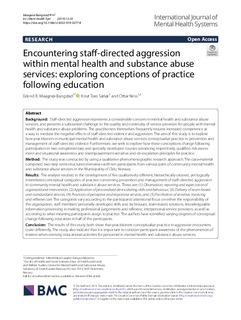| dc.contributor.author | Maagerø-Bangstad, Erlend Rinke | |
| dc.contributor.author | Sælør, Knut Tore | |
| dc.contributor.author | Ness, Ottar | |
| dc.date.accessioned | 2019-10-25T09:20:17Z | |
| dc.date.available | 2019-10-25T09:20:17Z | |
| dc.date.created | 2019-04-04T21:58:30Z | |
| dc.date.issued | 2019 | |
| dc.identifier.citation | International Journal of Mental Health Systems. 2019, 13 (20). | nb_NO |
| dc.identifier.issn | 1752-4458 | |
| dc.identifier.uri | http://hdl.handle.net/11250/2624401 | |
| dc.description | This article is distributed under the terms of the Creative Commons Attribution 4.0 International License which permits unrestricted use, distribution, and reproduction in any medium, provided you give appropriate credit to the original author(s) and the source, provide a link to the Creative Commons license, and indicate if changes were made. | nb_NO |
| dc.description.abstract | Staff-directed aggression represents a considerable concern in mental health and substance abuse services, and presents a substantial challenge to the quality and continuity of service provision for people with mental health and substance abuse problems. The practitioners themselves frequently request increased competence as a way to mediate the negative effects of staff-directed violence and aggression. The aim of this study is to explore how practitioners in municipal mental health and substance abuse services conceptualize practice in prevention and management of staff-directed violence. Furthermore, we seek to explore how these conceptions change following participation in two complementary and specially developed courses advancing respectively, qualified risk assessment and situational awareness and disempowerment-sensitive and de-escalation principles for practice.
The study was conducted by using a qualitative phenomenographic research approach. The data-material comprised two-step semi-structured interviews with ten participants from various parts of community mental health and substance abuse services in the Municipality of Oslo, Norway.
The analysis resulted in the development of five qualitatively different, hierarchically ordered, yet logically interrelated conceptual categories of practice concerning prevention and management of staff-directed aggression in community mental health and substance abuse services. These are: (1) Observation, reporting and expectation of organizational intervention, (2) Application of personalized de-escalating skills and behaviour, (3) Delivery of team-based and standardized services, (4) Provision of perceptive and responsive services, and (5) Facilitation of sensitive, involving and reflexive care. The categories vary according to the participants’ attentional focus on either the responsibility of the organization, staff members’ personally developed skills and techniques, team-based solutions, knowledgeable information processing in making professional judgements and reflexive, interpersonal service provision, as well as according to what meaning participants assign to practice. The authors have identified varying degrees of conceptual change following education in half of the participants.
The results of this study both show that practitioners conceptualize practice in aggressive encounters quite differently. The study also indicate that it is important to consider participant awareness of the phenomenon of interest when devising educational activities for personnel in mental health and substance abuse services. | nb_NO |
| dc.language.iso | eng | nb_NO |
| dc.rights | Navngivelse 4.0 Internasjonal | * |
| dc.rights.uri | http://creativecommons.org/licenses/by/4.0/deed.no | * |
| dc.title | Encountering staff‑directed aggression within mental health and substance abuse services: exploring conceptions of practice following education | nb_NO |
| dc.type | Journal article | nb_NO |
| dc.type | Peer reviewed | nb_NO |
| dc.description.version | publishedVersion | nb_NO |
| dc.rights.holder | © The Author(s) 2019. | nb_NO |
| dc.source.pagenumber | 13 | nb_NO |
| dc.source.volume | 13 | nb_NO |
| dc.source.journal | International Journal of Mental Health Systems | nb_NO |
| dc.source.issue | 20 | nb_NO |
| dc.identifier.doi | 10.1186/s13033-019-0277-8 | |
| dc.identifier.cristin | 1690347 | |
| cristin.unitcode | 222,56,3,0 | |
| cristin.unitname | Institutt for helse-, sosial- og velferdsfag | |
| cristin.ispublished | true | |
| cristin.fulltext | original | |
| cristin.qualitycode | 1 | |

